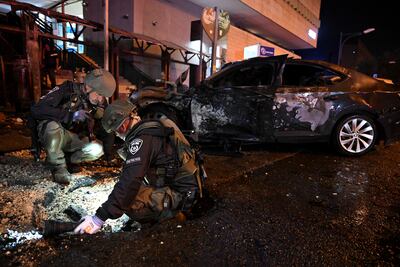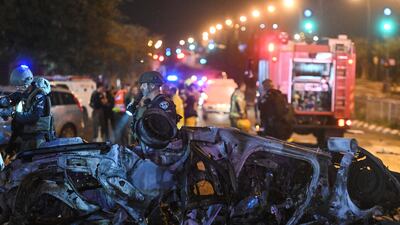Four people were killed in Israeli strikes on southern Lebanon on Thursday night as border fighting reached a peak after weeks of clashes.
Israel pummelled southern Lebanon after a volley of Hamas and Hezbollah rockets were fired from across the border, killing four in the Wadi Saluki area, according to state media.
Hamas's Al Qassam brigades said it had launched 12 rockets at the northern Israeli city of Kiryat Shmona and its surroundings "in response to the massacre in Gaza", while Hezbollah said it had launched 19 simultaneous attacks, firing artillery and missiles at border posts.
The Israeli military later said it was striking a series of Hezbollah targets across the border.
While Israel and Lebanese militants have regularly traded fire in recent weeks, the Thursday attacks were the most significant since the Israel-Gaza war began in early October.
Two Israelis were wounded by shrapnel in Kiryat Shmona, the most populous settlement in the border region, which has been largely emptied in recent weeks amid a rise in cross-border clashes.
The threat of a wider regional conflict is mounting as Israel continues to pound the besieged Gaza Strip, where more than 9,000 people have been killed in air strikes, about three quarters of them women, children or elderly.
That threat grew more pronounced on Thursday night as Iraqi militia groups claimed a drone fired towards Israeli positions on Dead Sea earlier in the day.
In a statement on pro-militia Telegram channels, the "Islamic Resistance of Iraq" claimed the attack was "in support of our people in Gaza, and in response to the massacres committed ... against Palestinian civilians".
There was no immediate comment from Israel.
It comes a day before Hezbollah chief Hassan Nasrallah is due to make his first comments on the Israel-Gaza war, which has claimed the lives of more than 10,400 people in less than a month.

More than 70 Lebanese have been killed by Israeli attacks since October 7, as Lebanon becomes more enmeshed in the war in Gaza.
This includes 50 Hezbollah fighters and Reuters journalist Issam Abdallah, who was killed while covering Israeli air strikes on southern Lebanon.
Referencing the fighting during a nightly press briefing, Israeli army spokesman Daniel Hagari said Israel “will respond with action and not words”.
“Dozens of jets are flying all over the Middle East at any given time. Our enemies see that,” he said on Thursday.
The military also accused Iran of sending proxy militias from Syria into southern Lebanon to attack Israel, a claim denied by Hezbollah.
Hezbollah said it had launched the Thursday attack in response to Israeli fire on the disputed Shebaa Farms.
Analysts say Mr Nasrallah is unlikely to declare all-out war on Israel, with many Lebanese fearing such a conflict could push an already struggling country past its breaking point.
The White House on Thursday said that it was concerned by the escalation.
“We're concerned about continued attacks on Israeli forces there in the north, as are the Israelis,” National Security Council spokesman John Kirby told reporters during a news briefing.
However he added that “I don't believe we've seen any indication yet specifically that Hezbollah is ready to go in full force”.
Speaking before departing the US for another visit to Israel, Secretary of State Antony Blinken also said Washington is looking to avoid further fighting on the border.
“We are determined to prevent escalation on any of these fronts, whether its Lebanon … the West Bank, whether it’s anywhere else in the region,” he told reporters on the tarmac.
France has also called for calm between Lebanon and Israel.
Defence Minister Sebastien Lecornu is currently on a visit to Lebanon, warning against a wider regional conflict.
A war with Israel “could have major escalatory effects on the whole region”, Mr Lecornu said in a visit to French UN peacekeepers in the south on Thursday.
President Emmanuel Macron has also said Paris is working to maintain calm between the two countries, while Foreign Minister Catherine Colonna is also due to visit the Middle East on Sunday in a bid to bolster diplomatic efforts to end the war.
Israel has warned any conflict with Lebanon would be much more destructive than the 2006 Lebanon war, which killed at least 1,200 Lebanese.
“Hezbollah may decide to act, and we will have to respond,” Israeli Strategic Affairs Minister Ron Dermer told reporters earlier this week.
“The response now will make what happened in 2006 look like child's play.”


